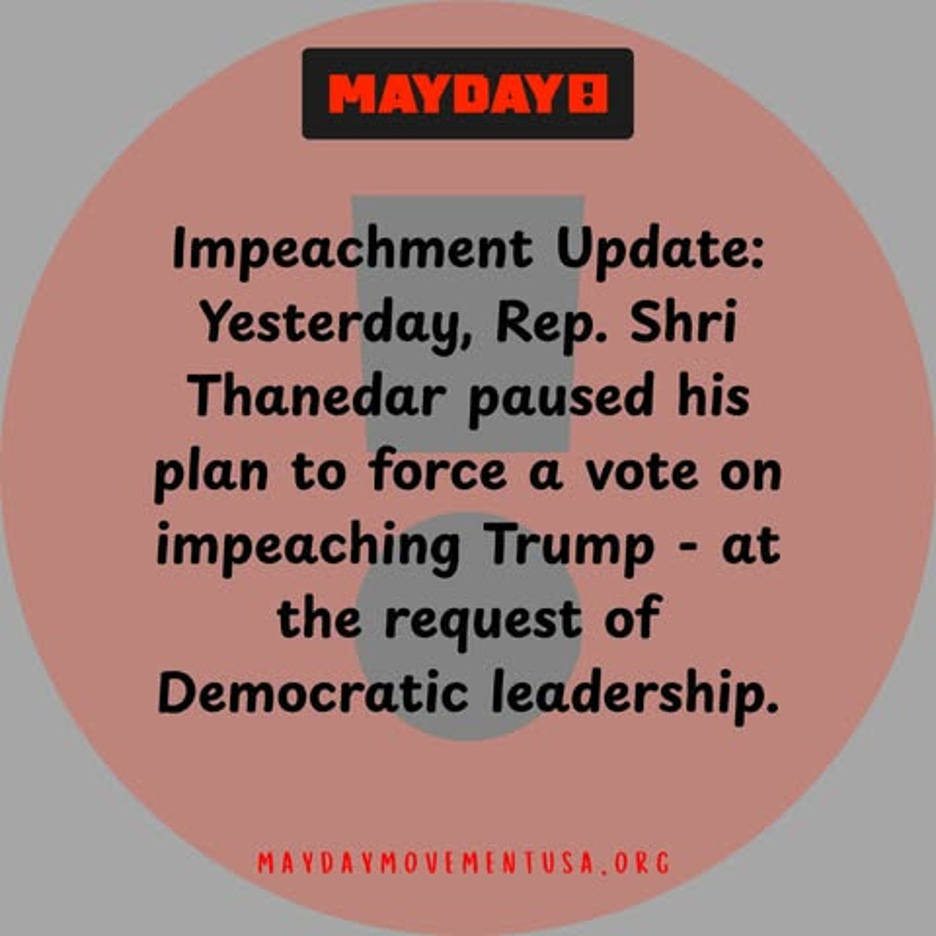Shri Thanedar's Trump Impeachment Push: How Democratic Infighting Led to Retreat
The Inside Story of Rule IX, Political Backlash, and the Challenges of Accountability
Editor’s Note:
This piece was originally published under 50501 CA banner, where I was part of shaping its early voice and mission. At the time, I didn’t know it would become Part 1 of a series but here we are. I’ve since stepped away from the 50501 CA editorial team to protect my peace and focus, though I remain active locally with 50501 SF.
I’m republishing this not because I expect Congress to suddenly grow a spine, but because pretending it didn’t happen would be worse. Part 2 of the impeachment series is coming soon. Truth, like my conure, Frodo, doesn’t just go quiet because it’s inconvenient.
May 16, 2025
As my conure tries to prevent me from typing by biting, it serves as a perfect metaphor for Washington's struggle to hold power accountable. Much like my stubborn bird who alternates between demanding attention and attacking the keyboard, the push to impeach Donald Trump has been a chaotic dance of advance and retreat - a flurry of activity followed by sudden retreats to safer perches.
Background on Shri Thanedar
Shri Thanedar, a Democratic Representative from Michigan, has been known for his independent streak and willingness to challenge the status quo. A former scientist and entrepreneur who arrived in America with just $20 in his pocket, he entered politics with a focus on progressive values and accountability shaped by his immigrant experience. Thanedar's approach often reflects his profound respect for democratic institutions and his desire to hold powerful figures accountable, which drove his decision to push for Trump's impeachment despite the lack of broad support within his party.
In May 2025, Thanedar made headlines with his bold attempt to impeach President Donald Trump. This move was characterized by the introduction of seven articles of impeachment, which accused Trump of various high crimes and misdemeanors, including obstruction of justice and abuse of presidential power. However, this ambitious initiative quickly unraveled under the weight of internal party dynamics and pressure from Democratic leadership, culminating in Thanedar's retreat from the impeachment push just hours before a scheduled vote.
The 27-Hour Rebellion: A Timeline
May 13, 2:15 PM EST: Thanedar invokes House Rule IX, triggering a mandatory impeachment vote within 48 legislative hours. This rarely used parliamentary maneuver bypasses leadership approval entirely, forcing the full House to either vote on or table impeachment, setting the stage for a dramatic and ambitious push by Thanedar. The seven articles allege:
Obstruction of Justice: Allegations that Trump interfered with investigations into his administration's actions.
Abuse of Power: Claims that Trump used his presidential authority for personal gain.
Violation of First Amendment Rights: Accusations that Trump undermined free speech and press freedoms.
Misappropriation of Funds: Charges that Trump diverted funds in violation of congressional appropriations.
Creation of the Department of Government Efficiency: Claims that this action was unconstitutional and exceeded presidential authority.
Incitement of Violence: Allegations that Trump encouraged violent actions against political opponents.
Undermining Electoral Integrity: Claims that Trump sought to manipulate electoral processes for personal advantage.
May 14, 8:00 AM: Thanedar arrives to find his Judiciary Committee staff reassigned—two aides temporarily detailed to "constituent services”.
May 14, 11:30 AM: News breaks that Rep. Rashida Tlaib (D-MI) endorsed primary challenger Donavan McKinney with a $47,000 transfer from her PAC.
May 14, 3:00 PM: Thanedar announces delay of vote, citing need for "additional evidence gathering"—just 27 hours after his bold stand.
This sequence of events highlights the challenges faced when pursuing impeachment without unified support. The internal dynamics of the Democratic Party, including resistance from influential members and the lack of coordination, contributed to the abrupt withdrawal of the impeachment effort.
The Backlash
The reaction from Democratic colleagues was swift and severe. Privately, some described the move as “the dumbest fucking thing” (Axios, May 13, 2025), while leadership signaled their intent to table the measure. Prominent voices like Rep. Jamie Raskin and Rep. Pete Aguilar stressed the importance of strategic consensus over individual initiatives. Raskin's statement, “it's not enough to be right,” underscored the broader party objective of unity and the prioritization of legislative goals over contentious impeachment proceedings.
The metaphor of my conure’s unpredictable behavior now mirrors the unpredictable shifts within Thanedar's party. The impeachment initiative, initially seen as a bold stand, quickly became a point of contention that required a retreat to avoid divisive fallout.
Progressive Hypocrisy
Public Cheerleading, Private Sabotage: Justice Democrats tweeted support but refused to draft legal revisions for Thanedar’s articles, according to three progressive aides. Simultaneously, they endorsed Thanedar’s primary challenger, state Rep. Donavan McKinney.
Squad Silence: Despite their anti-Trump rhetoric, Reps. Ocasio-Cortez and Tlaib privately urged Thanedar to drop the effort, calling it a "distraction" from Medicaid cuts. Rep. Brad Schneider remarked, "We need to focus on reconciliation, not impeachment theater" (Axios).
The Trumpian Counterattack
Public Humiliation: Trump mocked Thanedar as a "dumb lunatic" at a Michigan rally, while GOP leaders pledged to "discard [the articles] like trash." The White House leaked a statement framing Thanedar as "siding with illegal immigrants," a move of psychological warfare.
Procedural Ambush: House GOP leaders preemptively scheduled a vote to table the measure, forcing Democrats to publicly choose sides.
Thanedar’s Retreat
Faced with mounting pressure from party leadership and a lack of support from his colleagues, Thanedar announced his decision to withdraw the impeachment resolution. The anticipated vote to table the motion would have effectively killed the initiative, prompting Thanedar to reconsider his approach. His retreat was a recognition of the political realities within the Democratic Party and the need to prioritize collective action over individual ambition. Key factors included:
Establishment Freeze-Out: All three initial co-sponsors fled like spooked starlings, leaving him isolated on the branch.
Progressive Pecking Order: Justice Democrats flocked to his primary rival, their loyalty as fickle as my conure’s attention span.
Procedural Cage: Without committee backing, Rule IX became a gilded perch—high visibility, no leverage.
The Irony
Even as Washington’s flock disowned him, the very grassroots activists who helped elect Thanedar continued to chirp for accountability—a dissonant chorus drowned out by the louder squawks of political expediency. Like my bird’s futile attacks on its own reflection, their faith in the system persisted against all evidence.
An Update
In behind-the-scenes discussions, Rep. Thanedar revealed additional reasons for his decision to pause the impeachment push. Despite the irony of his situation, he saw strategic value in this pause:
Legal Risk: Thanedar was concerned that a failed impeachment vote could undermine current lawsuits challenging presidential overreach. If Congress isn't willing to impeach over certain issues, it could weaken claims of congressional power violations in court.
Political Opportunity: This involves both Republican and Democratic considerations:
Republican Shifts: Some Republicans are reconsidering their stance, especially after new developments like the proposed Qatari jet situation. Thanedar sees potential to gain support by revising his articles to include these issues.
Democratic Leadership's Offer: Party leaders have proposed forming a working group to help revise the articles for broader support, avoiding a rushed vote that could put Democrats in a difficult position.
Thanedar has given leadership a short window to demonstrate progress. If they fail to act, he is prepared to reintroduce Rule IX and move forward independently suggesting this pause is tactical, not a retreat.
Just as my conure retreats to its cage in search of safety and security, Thanedar's withdrawal mirrored this instinctual move away from a precarious situation. However, he's poised to strike again if the opportunity arises.
Moreover, in his statement following the withdrawal, Thanedar expressed a commitment to continue advocating for accountability and constitutional integrity. He acknowledged the hesitancy within his party but maintained that public sentiment supported his push for impeachment. Colleagues, including Aguilar, reiterated the importance of focusing on pressing legislative priorities rather than divisive impeachment efforts.
Broader Implications
Thanedar's retreat raises critical questions about the future of impeachment as a tool for political accountability in the United States. The lack of support for his resolution suggests that any future attempts to impeach Trump or other officials may face similar challenges, particularly if they are not aligned with broader party strategies and objectives.
The dynamics surrounding Thanedar's impeachment push reflect broader concerns about the state of democracy and accountability in the United States. As political polarization intensifies, the ability of Congress to hold the executive branch accountable is increasingly compromised. The implications of this trend extend beyond individual impeachment efforts, raising fundamental questions about the health of democratic institutions.
The Aftermath
Shri Thanedar's impeachment push against Donald Trump serves as a case study in the complexities of American political dynamics. His initial resolve to hold the president accountable was ultimately undermined by party pressures and a lack of consensus. This episode underscores the challenges faced by lawmakers in navigating the intersection of law, politics, and public sentiment.
Though Thanedar vowed to continue, the message was clear: In today’s Washington, accountability is less important than avoiding awkward votes.
As my conure finally settles on my shoulder, I’m reminded that even the most stubborn reformers get cage bound.
Always unfiltered, always fighting—Zorha.
P.S. If you'd like to support this work, consider subscribing (it's free!) or chipping in to help cover the cost of protest signs and other activism efforts by clicking the Buy Me Coffee (button). Every bit helps.
Sources
Axios. (2025, May 13). "What a dumbs**": Democrats privately rage over "utterly selfish" impeachment vote”. Retrieved from https://www.axios.com/2025/05/13/donald-trump-impeachment-thanedar-democrats-react
U.S. Congressman Shri Thanedar. (2025, May 13). Rep. Shri Thanedar Calls For Vote on Trump Impeachment. Retrieved from https://thanedar.house.gov/media/press-releases/rep-shri-thanedar-calls-for-vote-on-trump-impeachment
Associated Press. (2025, May 14). Democratic congressman pushes Trump impeachment, but backs down from vote [Brown, M., Mascaro, L., & Askarinam, L.]. Yahoo News. Retrieved from https://www.yahoo.com/news/democratic-congressman-pushes-articles-impeachment-145735962.html
Politico. (2025, May 1). Impeachment snafu prompts a friendly reminder to House Democratic aides. Retrieved from https://www.politico.com/live-updates/2025/05/01/congress/thanedar-impeachment-snafu-00321809
Newsweek. (2025, May 15). Donald Trump issued warning as impeachment vote abruptly canceled. Retrieved from https://www.newsweek.com/donald-trump-impeachment-vote-canceled-2072567
The New Republic. (2025, May 14). Democratic infighting over impeachment. Retrieved from https://newrepublic.com/post/195233/democrats-pissed-donald-trump-impeachment-attempt
MayDay Movement. (2025, May 15). Mayday movement USA Instagram post on impeachment update. Retrieved from
A post shared by @maydaymovementusa





